- 19 minute read
- SEO
- Websites
All Skill Levels
Get a behind-the-scenes-look into FareHarbor's 2024 season

One of the most important steps of link building is finding websites or bloggers whose content resonates with you – or better yet, with your audience. But before you take the leap and reach out to ask them to link to your web page or blog post, you should take an additional step to find out if the site will positively impact your link building strategy: use a domain authority checker to vet the site.
Domain authority is a score used by SEO tools like Moz that tells you whether or not a site or page is trusted among other websites based on the backlinks they receive. Usually ranging from one to 100, higher scores mean the site is predicted to rank higher. When curating links for your link building strategy, the higher the website’s domain authority, the better. Keep reading for tips on using domain authority checkers and additional link building advice.
Not all links are equal. As we mention in our link building guide, backlinks from low-quality or spammy sites won’t do you much good. It’s somewhat easy to tell if a site has high authority just by looking at it or doing a bit of research on the brand. For example, if you received a backlink from a website like Travel + Leisure, you could safely assume that you’d get quality traffic with a high potential of increased bookings.
However, it can be difficult to get links from well-established websites in your niche, especially if they’re a recognized brand – they probably receive hundreds of link building requests on a regular basis. Rest assured, there are plenty of relatively high-authority sites out there, even if they are lesser known domains. Determining which ones to pursue for your link-building strategy starts with testing out the following domain authority checkers.
No matter which domain authority checker you decide to use, keep in mind that this is not an actual Google metric. These tools evaluate the quality and quantity of backlinks of each website and predict its likelihood to rank. They’re an excellent starting point for expanding on your link building strategy.
Scale: 1-100
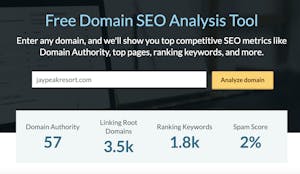
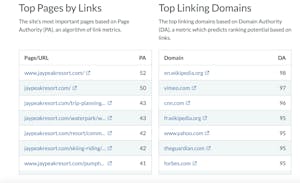
Moz Domain Authority is a search engine ranking score that predicts how likely a website is to rank in the SERPs. Moz evaluates it based on linking root domains (count of unique root domains with at least one link to the page/site) and the number of total links to a website. This tool is more useful at the domain level, rather than the page level.
How to Check Moz Domain Authority
Use the free SEO toolbar here. You can also check domain authority through Moz’s Keyword Explorer (in the SERP Analysis section) or the Link Explorer.
Scale: 1-100
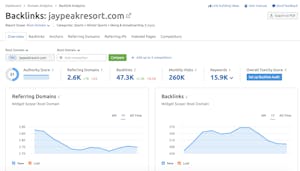
The Semrush Authority Score measures the impact of a domain or webpage’s links. The tool looks at organic search data, backlink data, and website traffic data, as well as watching how a website gains links to increase or decrease its authority. The Semrush Authority Score shows you the number of backlinks, referring domains, and referring IPs.
How to Check Semrush Authority Score
Visit the Domain Overview page or the Link Building Tool page.

Pro tip: Find niche-specific domains to get links from in the Link Building Tool’s Rating column.
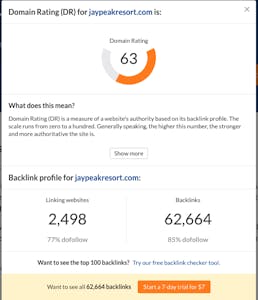 3. Ahrefs Domain Rating
3. Ahrefs Domain RatingScale: 0-100
Ahrefs’ Domain Rating metric takes into account the number of backlinks the target site has as well as how many other domains those sites link to. It also looks at the authority of those linking domains. The higher a website’s Domain Rating, the more authoritative it is. This metric does not take into account domain age or traffic.
How to Check Ahrefs Website Authority
Check Website Authority and learn more about how it’s measured here.
Scale: 0-100
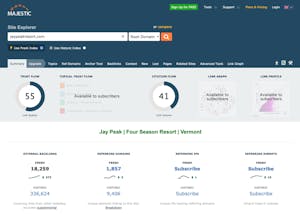
Instead of measuring the quantity of backlinks, Majestic’s Trust Flow metric represents the quality of links. Majestic’s data comes from a manual review of the web, in which they collected many trusted seed sites for reference. Sites that are closely linked to a trusted seed site will see a higher score.
How to Check Majestic Trust Flow
Use the Site Explorer tool to find backlinks. For more detailed analysis, try Link Context, which shows you the estimated page position of links as well as what the surrounding content is made up of (e.g. text, images, etc.).
Play around with all four tools to see which one works the best for you with regard to pricing, features, and results. Many of these SEO platforms offer additional link building tools to explore. Start improving your link building strategy today! For more ways to increase your website’s visibility online, consider working with a Destination Marketing Organization. Looking for more SEO tools? Try these!